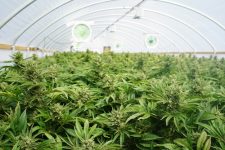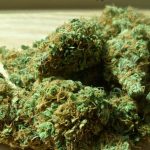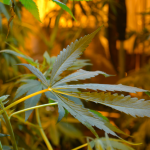Decriminalising Medical Cannabis: An Interview with NSW Labor MLC Adam Searle

NSW Opposition leader Luke Foley introduced a game-changing medicinal cannabis bill before parliament on March 9, which has largely gone unnoticed. The legislation calls for the decriminalisation of possession of the medicine, as well as establishing “a lawful supply chain.”
“We know that for some people with terminal illnesses and very serious illnesses, medicinal cannabis is the only effective form of pain relief,” minister Foley told parliament. “They should not be treated as criminals under our legal system.”
Decriminalisation of possession
The Public Health (Medicinal Cannabis) Bill 2017 proposes to allow medical marijuana users and their carers to be in possession of up to 15 grams of dry cannabis or the equivalent amount of other products – 1 gram of cannabis oil and 2.5 grams of cannabis resin – without the threat of arrest or prosecution.
The protections would apply to patients suffering from a terminal illness, or a serious illness or condition, which include severe intractable epilepsy, HIV, multiple sclerosis and pain associated with cancer.
A register of “authorised cannabis patients and carers” would be established. This would require a patient to produce a certificate from their medical practitioner acknowledging the diagnosis of a relevant condition.
Lawful supply
The legislation would also establish a system that allows for the legal cultivation, manufacture and supply of crude cannabis products for registered users. This would include a regulatory licensing and permit scheme requiring criminal record checks and other eligibility requirements.
Mr Foley made clear that registered users and carers will be permitted to “manufacture or produce cannabis by making a preparation or admixture” at home. But it seems that this doesn’t necessarily mean cultivation of home grown crops.
The use and supply of medical marijuana wouldn’t be allowed in public. And the provisions of the legislation would be reviewed three years after it was enacted.
A medicinal cannabis advocate weighs in
Gail Hester president of the Medical Cannabis Users Association said “the general consensus among the cannabis community in NSW is that it is a good start,” as it’s the only “reform that gives patients legal rights,” and it no longer leaves arrest up to the discretion of police.
According to Ms Hester, “the bill has the potential to reduce the health budget considerably.” Prescribed painkillers that are currently used for chronic pain are expensive, she said. And money spent on pharmaceuticals produced overseas will stay within the Australian economy.
However, the former nurse said that one part of the bill that needed revising was the amounts allowed for possession, as the amount of raw cannabis needed to make a small batch of oil is quite significant.
“Cancer patients require a daily dose of up to 3 grams per day,” Ms Hester outlined. “The government has to catch up with the knowledge bank of the people on this subject.”
Sydney Criminal Lawyers® spoke with NSW leader of the Opposition in the Legislative Council Adam Searle -the author of the bill – about what this ground breaking legislation entails.
The Public Health (Medicinal Cannabis) Bill 2017 seems to be a bit of a game-changer, but it’s gone largely unnoticed. Why do you think that is?
Well, take the Land and Property Information – the privatisation of the land title office – it’s in the news every other day now. But, it went through parliament last year in September.
Often there’s a lag time between significant things happening in parliament and people paying attention to it. Largely, because if it’s not on the instant media radar, often people don’t become informed.
Minister Foley introduced the bill into parliament on March 9. What is the status of it today?
It’s awaiting debate in the lower house. So it may come on for debate tomorrow or possibly, more likely, when we return in May.
So it allows for a patient to possess 15 grams of dry cannabis or equivalent amounts of other cannabis products. Is this a reasonable amount to expect a user of the medicine to be in possession of at any given time?
It’s the amount that was recommended by the upper house parliamentary inquiry in 2013 that I was part of. And that was the amount that everyone could agree on.
However, the bill does permit other amounts to be possessed. So depending on the particular needs of a particular patient, it’s possible for the regulation to enable them to possess a different amount.
But that would obviously have to be passed on the needs of that patient and only after all of the protocols provided for in the legislation had been put in place.
And what about in the case of a parent providing medication for their child. How does the bill provide protections for them?
The bill essentially decriminalises acquisition and possession for medicinal use.
So at the moment, parents who do that for their children – and let’s face it, if you’ve got children, you would do anything to prevent your children suffering – they are now breaking the law and being exposed to very serious criminal sanctions.
But the bill protects them from that by decriminalising it.
The bill, importantly, also provides a mechanism to create a lawful supply chain. At the moment, people are at the mercy of buying product on the black market. And you don’t know what’s in that.
It’s not quality controlled for THC or CBD. So you don’t know whether you’re getting what you need, or in what dosage. And also, whether it’s covered in pesticides, or has other contaminants or pollutants.
You really are at the mercy of whatever product is available. And what we see as the future is a supply chain authorised by law, which is properly quality controlled to meet the needs of patients.
Would this licensing scheme allow for only large businesses to be cultivating and manufacturing the products, or would small producers be able to do so as well?
The mechanism is sufficiently flexible. It would potentially authorise production on a small scale or on a very large commercial scale.
And it’s quite likely that in the future, you’d want to permit a multiplicity of businesses to produce, under licence, the products for medicinal purposes. Or maybe the state would decide that it would be better to do that itself.
The mechanism is flexible and that would depend on how many potential patients need the product and therefore, that would determine the scale of production to be authorised under the lawful supply chain.
And what about allowing people to grow their own at home?
Look at the moment, the problem with that is that you again don’t know – unless you’re a very skilled botanist – whether you’re getting a plant that produces – you know, some people would need the THC content to be at a certain level, for other people they would need the THC content to be low and to have a high CBD content.
So unless you’re pretty skilled at breeding, most people wouldn’t possess those skills.
While I wouldn’t rule that out, the focus is really about having a lawful supply chain that produces a standardised product that people can safely acquire that actually has the content that they need.
Again, allowing people to grow that in their own backyard, they still run the risk of not having exactly what they need.
At the moment, people are taking pot luck and that’s not really suitable.
NSW police roadside drug testing tests for traces of THC in a driver’s system. What would this mean for those using the medication and driving?
This bill does not deal with roadside testing. It does not deal with the issue of so-called drug driving. It simply has no impact on that.
Obviously, the impact it has depends on what products people take and whether that shows up in a test.
I mean, if you are on heavy medication, the recommendation is that you don’t use heavy machinery and you don’t drive.
And that should be the same for all sorts of drugs if they have the risk of impairment of motor function and the like.
And would current NSW laws that deal with illicit substances – the Drug Misuse and Trafficking Act 1985 and the Poisons and Therapeutic Goods Act 1966 – need to be amended for this bill to be enacted.
The bill contains all the changes necessary to facilitate the lawful and safe supply of medicinal cannabis in NSW.
And just lastly, is there similar legislation like this operating in Australia or around the world, where it’s actually been enacted and is functioning now?
In other parts of the world there are very different approaches.
So for example, there was a medicinal cannabis conference in Sydney last week – and there were people from Israel, the Netherlands and Germany – and each of the countries take a different approach. Different from each other, and certainly different from Australia.
There is no bill like this in effect in Australia.
The federal government has pretended to provide access to medicinal cannabis federally, but doctors and patients alike will tell you that the regime does not work. And people are still not being able to get access.
Thanks very much for speaking with us today Minister Searle.
Thank you.







